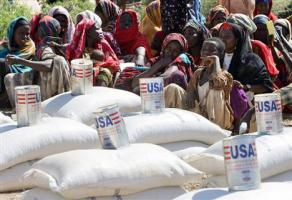The United States Agency for International Development (USAID) and its partners CARE Ethiopia and Catholic Relief Services, along with representatives from the Ministry of Agriculture and Natural Resources, marked the launch of a new program that will assist poor households in the rural highlands areas of Ethiopia.
The program helps to diversify their livelihoods and graduate from the Ethiopian Productive Safety Net. USAID’s new “Livelihoods for Resilience” program will operate in 36 woredas in Oromia, Amhara, SNNP and Tigray Regions and is anticipated to be a $60 million investment over five years.
The national level launch in Addis Ababa was opened by State Minister for Agriculture and Natural Resources, Ato Damene Darota and USAID/Ethiopia Mission Director Leslie Reed.
Speaking at the event Ms. Reed noted that, “We believe that building resilience to shocks and introducing individuals and communities to new ideas, skills and opportunities can transform lives. We have seen how this transformation has empowered households and enabled them to take the necessary steps to grow their assets, increase their income, and eventually graduate from the government safety net. This is what we call a sustainable pathway out of poverty.”
Ms. Reed recalled USAID Administrator Green’s recent visit to Ethiopia where he announced that Ethiopia will be one of 12 focus countries under the new US Global Food Security Strategy.
“Livelihoods for Resilience” works in support of the livelihoods component of the Government of Ethiopia’s Productive Safety Net Program (PSNP 4) and collaborates closely with Ethiopian government counterparts at all levels. The program will reach close to 130,000 households in 36 woredas across the Ethiopian highlands. The program will support households currently enrolled in PSNP 4 to build resilient livelihoods and improve food and nutrition security, even in the face of shocks and stresses. The program will provide business skills and financial literacy training to targeted households and ensures access to micro-finance, high quality agricultural supplies, and technologies that enable small-holders and micro-enterprises to successfully link to markets.
USAID’s program is implemented by two consortiums of local NGOs and partners led by CARE and CRS, longstanding partners of the Agency.

